Today in the United Kingdom (although other countries celebrate on different dates) we celebrate Mother’s Day, so in today’s new post we’re going to take a brief look at a woman whose life was all too brief: Maria Branwell, whose daughters Charlotte, Emily and Anne Bronte changed the world of literature forever.
Maria Branwell was born into a prosperous and well connected merchant family in Penzance, Cornwall on 15th April 1783. Her father Thomas Branwell was a wealthy businessman, and under him the Branwell property empire and fortunes grew. Maria’s brother Benjamin rose to become Mayor of Penzance, but she was particularly close to her sisters Charlotte and Elizabeth, who would become better known as Aunt Branwell after sacrificing everything to raise Maria’s children after her tragic and untimely passing. At the top of this post you can see Maria (in blue) in a Penzance mural.
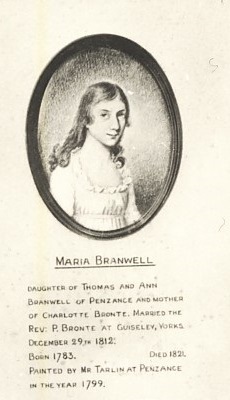
It was the death of Maria’s parents Thomas and Anne that led her, in the summer of 1812, to make the arduous journey from Cornwall to Yorkshire to work as an assistant in a school that had been opened by her Aunt Jane and Uncle John Fennell (as a comparison, this is a longer journey in miles than the one her daughters Charlotte and Emily would later take when they travelled from Haworth to Brussels).
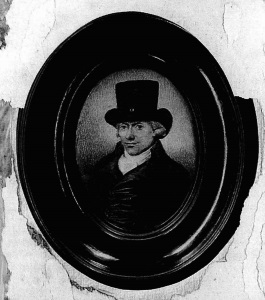
The school was in Rawdon, between Bradford and Leeds, and John Fennell had recently recruited a new classics examiner for the schoolchildren. It was a friend of his from his days in Shropshire who had also moved to Yorkshire. He was of course Patrick Brontë, and when he and Maria first saw each other it was love at first sight. The rest, as they say, is literary history.
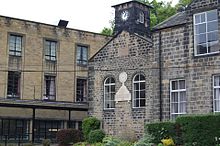
One part of Maria’s story that is often overlooked is that she herself was a brilliant mind and an excellent and fluid writer, as Charlotte Brontë found out as an adult when presented with a very special gift by her father. It was a lovingly preserved and cared for package of her mother’s letters, and the effect on her was very moving:
‘It was strange now to peruse for the first time the records of a mind whence my own sprang – and most strange – and at once sad and sweet to find that mind of a truly fine, pure and elevated order. They were written to papa before they were married – there is a rectitude, a refinement, a constancy, a modesty, a sense, a gentleness about them indescribable. I wished she had lived and that I had known her.’
We still have some of Maria’s love letters to Patrick, who she christened ‘my saucy Pat’, and they are beautifully written, often playful, but most obviously full of love. By this time neither she nor Patrick were in their first flush of youth, she was approaching her thirtieth birthday and he was six years older, but they fell head over heels for each other almost instantly, and were married within six months of their first meeting.
As early as 5th September 1812 their love is evident, as is the fact they had already decided to be together:
‘O my dear friend, let us pray that we may live lives holy and useful to each other and all around us! I pitied you in your solitude, and felt sorry it was not in my power to enliven it.’
By 18th September, Maria was writing:
‘I believe a kind Providence has intended that I shall find in you every earthly friend united; nor do I fear to trust myself under your protection, or shrink from your control. It is pleasant to be subject to those we love.’
Maria was certainly having an effect on Patrick too, and he could think of nothing but his love to the point where he often forgot anything else. After forgetting to tell the Fennells about visitors to the school that he had arranged, John Fennell thought Patrick’s behaviour had become so out of character that he should be sent to the lunatic asylum in York (presumably he only said this in jest). Maria reports this in the same letter as above:
‘I do not know whether you dare show your face here again or not after the blunder you have committed. When I got to the house on Thursday evening, even before we were within the doors, we found that Mr and Mrs Bedford had been there, and that they had requested you to mention their intention of coming – a single hint of which you never gave. They all agreed that I was the cause of it. Mr Fennell said you were certainly mazed and talked of sending you to York. Even I begin to think that this bears some mark of insanity!‘
By 24th October, their feelings for each other were in no doubt, as Maria writes:
‘Unless my love for you were very great how could I so contentedly give up my home and all my friends… Yet these have lost their weight… the anticipation of sharing with you all the pleasures and pains, the cares and anxieties of life, of contributing to your comfort and becoming the companion of your pilgrimage, is more delightful to me than any other prospect which this world can possibly present.’
The last surviving letter of Maria’s extant today is dated 5th December:
‘We intend to set about making the cakes here next week, but as fifteen or twenty persons whom you mention live probably in your neighbourhood, I think it will be most convenient for Mrs Bedford to make a small one for the purpose of distributing there, which will save us the difficulty of sending so far.’
The cakes were for their wedding, as they were married in Guiseley’s St. Oswald’s church 24 days later. These were the letters that Charlotte Brontë loved to read, and they revealed a warm, witty, loving woman. This is how we should remember Maria Brontë, nee Branwell, as well as for the brilliant family she bore, as we say ‘Happy birthday, Maria Brontë!’ Incidentally, we’ll be saying that again in a week’s time, in a sense and for a different reason, as although we don’t know the exact date her first child, the kind, brilliant and prodigious genius Maria Brontë junior, was born, she was baptised on 23rd April 1814.
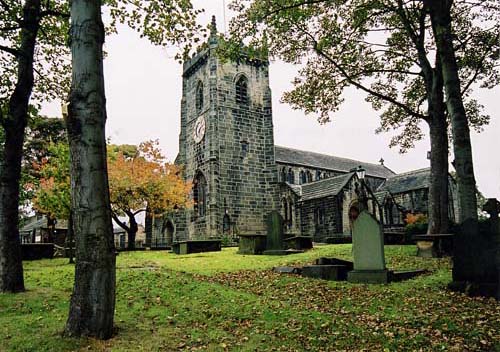
Five further children followed in quick succession: Elizabeth, Charlotte, Patrick Branwell, Emily Jane and Anne. Shortly after Anne’s birth the family moved to Haworth. Maria and Patrick were now in a larger property, with a larger income and a large family – it should have been the beginning of a period of great happiness in Maria’s life, but tragedy was drawing closer. Just a year after the birth of her youngest child, Anne, Maria fell desperately ill and after a long and painful illness she died. Nevertheless, her legacy lives on thanks to the works of genius by her brilliant daughters.
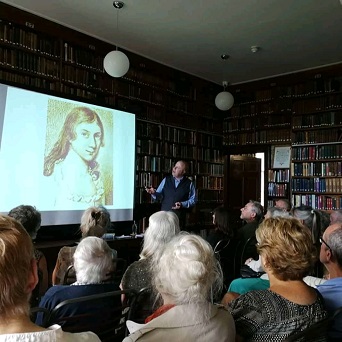
If you are a mother or grandmother, I would like to wish you a very happy Mother’s Day. If you are missing a special someone on this day, may the memories be happy and comforting ones. Thank you for all the positive comments after last week’s post regarding my upcoming Bronte podcast, look out for more news soon. I hope you will join me next week for another news Bronte blog post.
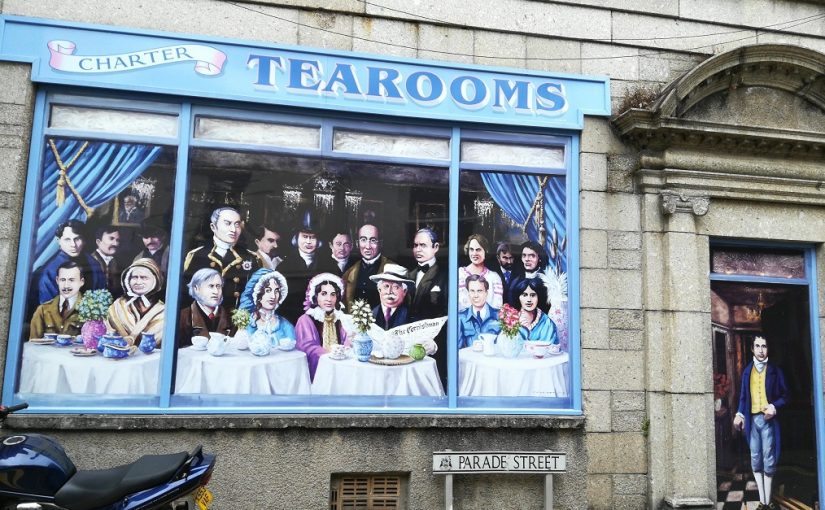
Just finished re-reading Wuthering Heights after 60 years. I was struck by Emily Brontë’s poem of remembrance of lost love…did a lost love of her youth inspire her novel?